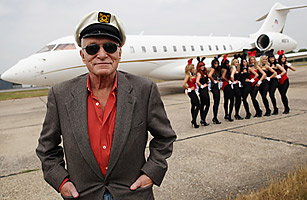
Sex forges unlikely alliances and Hugh Hefner, who has been the world’s most prominent personification of the unchained heterosexual male libido since his 1953 launch of Playboy magazine, forges unlikelier alliances than most. It’s not only that the 85-year-old is looking forward to marriage later this month to Crystal Harris, a psychology major-turned-Playboy Playmate and aspiring pop singer 60 years his junior. For more than half a century, Hefner has succeeded in uniting social conservatives of the political right and feminists of the left in opposition to his vision of sexual liberation as empowering women to throw off their domestic chains — and their clothes. The June 4 opening of London’s second iteration of the Playboy Club — the first such establishment shut its doors in 1981 — inspired two separate women’s groups to plan a joint picket under the punchy slogan “Eff Off Hef.” And coverage in the run-up to the launch highlighted another way its creator increasingly coalesces broad swathes of public opinion — in ridicule. “Old Mr Sticky Fingers” was how one British journalist described the Playboy founder. “They warned me he was old,” she wrote. “But, my god, nobody told me Hugh Hefner could barely get up.”
Even his admirers find something undignified in Hefner’s refusal to throw in the bunny-emblazoned towel and behave age-appropriately. Paul Wilkes, a Las Vegas-based gynecologist I interviewed for Amortality, my book about the changes in the expectations and realities of age and aging, compared Hefner to the ineffectual Wizard of Oz. Wilkes has attended golf tournaments at the Playboy Mansion. “The more you see behind the curtain over there, the less impressive it is,” he told me. The mansion was famously equipped with hot-and-cold running girlfriends who serviced Hefner’s needs until he pledged monogamy to Harris. “Living the dream,” my cab driver calls it, but he thinks Hefner should start acting his age.
Time to put away childish blondes? “He’s a sad old man,” replies the cabbie as he pulls up outside Hefner’s new Mayfair club.
I consider this description as I face Hefner in his hotel suite. He’s certainly old and his hearing is impaired — we sit knee-to-knee so that he can catch my questions. Like many folk of his age, he rarely changes out of his nightwear. But he doesn’t seem sad, either in the word’s purest meaning or in the sense the cab driver intended: pitiful, spent.
Indeed Hef’s black silk pajamas, wine-red damask robe and slippers are not the mark of retirement but quite the opposite, a signal that he still considers himself both playboy and player. At the beginning of this year, he successfully bought back Playboy shares to take the company private and he’s set about growing his empire again. London marked the second club opening in the revived chain after Las Vegas and further ventures are planned in Cancn, Macau and Miami. The London branch misses a trick: instead of fully embracing the retro chic of the original formula and channeling Mad Men, it teleports its team of pneumatic Bunny Girls into a harsher era of thudding house music in one bar and flat screen TVs in another; the restaurant serves “classic American cuisine with a Korean twist.” But NBC’s forthcoming drama series, The Playboy Club, set in a 1960s Chicago, is likely to sprinkle a handful of cool on the brand by depicting its eponymous setting as exactly the kind of place Don Draper would choose to patronize.
Meanwhile Playboy magazine, though chastened by the easy availability of internet pornography, retains a circulation of some 1.5 million. Hugh Hefner: Playboy, Activist and Rebel, a documentary by Oscar-winning filmmaker Brigitte Berman, released last year, makes bold claims for its subject’s legacy as a civil libertarian and philanthropist. So why the pity and the scorn directed at this amiable senior in his dressing gown? He thinks it’s because he’s refusing to submit to cultural expectations of the old. “To begin with I fought racism, then sexism, now I’m fighting ageism,” says Hefner. “One defines oneself in one’s own terms. If you let society and your peers define who you are, you’re the less for it.”
It’s not without irony to hear the man who did so much to promote his own definition and aesthetic of female sexiness complaining about stereotyping. He criticizes the women’s movement for failing to participate in “the sexual revolution that Playboy played such a part in. The notion that it should turn on itself and attack women who celebrated their sexuality is very puritan, very repressive and very counter-revolutionary.” He’s unable or unwilling to accept that Playboy, far from enabling the female of the species to explore her own sexuality, skillfully co-opted her into male fantasies.
Yet Hefner’s views on sexual politics, though long-held, can hardly be described as old-fashioned. In this post-feminist era, feminists must struggle to convince the world that their arguments are still relevant; Hefner, by contrast, sits firmly in the cultural mainstream.